#pedro i of portugal
Explore tagged Tumblr posts
Text
4 portuguese monarchs who might had same-sex relationships:
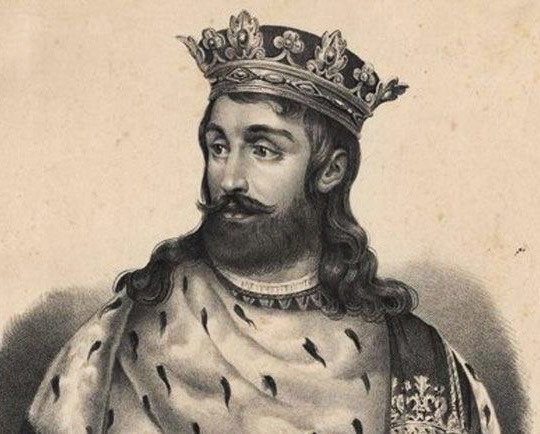
1) Pedro I of of Portugal, certainly, one if the most renowned portuguese monarchs, largely due to the saga of “love and passion” with Inês de Castro. Yet, it was common knowledge that she wasn't the Pedro’s only love: he harboured a passion for his squire, Afonso Moreira, a relationship that ended as disastrously as his other romantic (or not) entanglements. On one fateful occasion, Afonso was caught in bed with Catarina Tosse, wife of Lourenço Gonçalves, who was an esteemed magistrate.
Throughout his reign, Pedro earned the epithet “the Cruel” for his ruthless administration of justice, whereby transgressions of any magnitude often resulted in swift execution. Pedro’s decision to order Afonso’s castration as punishment for his adultery starkly manifested his merciless ethos. Nevertheless, according to Fernão Lopes, a chronicler of portuguese court at the time, in chapter VIII of “Crônica de el-rei D. Pedro I”, his harshness stemmed from a surge of jealousy on the king’s part upon discovering his beloved squire’s relationship with a woman.
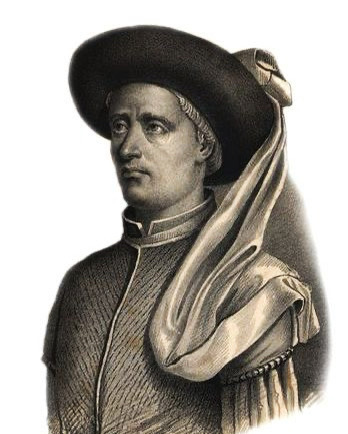
2) Prince Henry, revered as “the Navigator”, occupies a central role particularly during the epoch of maritime exploration.
He was hailed as “chaste prince”, having never entered into wedlock, with no historical accounts suggesting (with certainty) any relationships with women. In the annals of 1444, Henry experienced the loss of a “dear friend” in Ceuta, a tragedy that pluged him into 3 months of profound mourning. Both his father, King John I, and his brother, King Edward, counselled him to “rein in his emotions, lest he indulge men beyond what virtue dictates.”
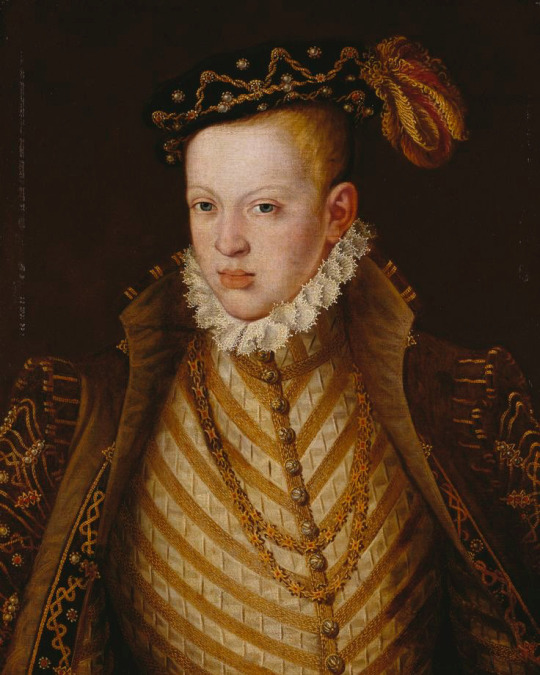
3) King Sebastian contracted gonorrhoea at the age 10/11, a malady documented in medical records at the time that rendered him sexually impotent. Some historians posit that this affliction may have dissuaded Sebastian from pursuing matrimonial unions or romantic relationships with women.
Even though, the “Crônicas de el-rei D. Sebastião” by Friar Bernardo da Cruz recounts an incident during a hunt in the Alentejo, where the entourage of nobles accompanying King Sebastian were stirred by a commotion. Investigating the disturbance, they stumbled upon the monarch locked in an embrance with a fugitive slave amidst the woodland.

4) King Afonso VI, sibling to Queen Catarina of Braganza, earned a reputation for rebeliouness and unruliness from a tender age, yet he harboured no ambitions for kingship.
His reign , marred by a series of missteps, was etched in history for its futile ventures. Despite grappling with severe health afflictions — such as partial paralysis stemming from hemiplegic fever, and scourge of bulimia — Afonso found solace in nocturnal escapades with his inner circle of friends. Among them was António Conti, an intalian peddler of opulent attire and accoutrements to Europe’s nobility. Conti’s sway in Afonso’s court burgeoned as he assumed the role of sartorial advisor and facilitator of introductions to foreign luminaries. Also, both grew increasingly closer to each other, with Afonso avoiding royal gatherings to spend time with Conti, mostly in his chambers.
In 1666, Afonso took the hand of Maria Francisca Isabel of Savoy, yet their union was fleeting. Maria, citing non-consummation owing to Afonso’s hemiplegia, sought an annulment. In letters to his sister, he bemoaned Maria’s coercive measures, by which she compelled him into relationships with 14 courtesants in a bid to unearth the root of their marital discord.
Seeking to shield Afonso’s sovereignty and secure the portuguese lineage, Luisa de Gusmão, his mother, sanctioned the arrest and subsequent exile of Conti to the distant shores of Brazil.
#i am sorry for how long it is#but i really wanted to post it#so there you have#theres other monarchs to talk about#but these are the ones with the most evidences#pedro i of portugal#prince henry#king sebastian#afonso vi of portugal#portugal#story time
18 notes
·
View notes
Note
"You're going to brazil" isnt a threat, its an inevitable fact like carcinization. All roads lead to rome? Wrong. Brazil
Pedro Álvares Cabral arriving on Brazil thinking he'd end up in India:
#and also Vicente pizon accidentally stumbling upon Brazil and not telling anyone#btw wether or not pedro Wanted to go to Brazil on purpose to discover the 'new land' is still heavily debated on#he did chat with the king of portugal at the time iirc#anyway i hope you enjoyed some of this Brazil Lore#joowee's pile of mail
24 notes
·
View notes
Text


On August 26, 1852, the frigate Dom Fernando, equipped for Dona Maria Amelia [of Brazil]'s trip, sailed the seas towards the island of Madeira.
The health of the young princess was not very reassuring. Deep emotions preceded her departure from Lisbon. At her insistent request, Queen Dona Maria da Glória [II of Portugal], her sister on her father's side, brought her children to hug their young aunt; sad forebodings hovered over the melancholic family farewells. Tenderly hugging the oldest of the Infantas, Dona Maria Amelia blurted out these words: "It's not true, Maria, you won't forget me?!"
(...) On January 20 [of 1853], she [Maria Amelia] received a very affectionate letter from Queen Dona Maria da Glória, her sister, she was deeply moved and said: "My sister Maria loves me very much; I also love her dearly".
(...) On May 10 in the afternoon, the ship [that carried Maria Amelia's body back to Portugal] anchored in Cascais and parked there until the following day at ten o'clock. Passing through the forts at the entrance to the Tagus, she was greeted by all national and foreign vessels. The first were flagged in black.
Several great court figures had come to the tower of Belém, to meet the Empress [Amélie of Brazil, Maria Amelia's mother], and had climbed aboard. At noon, anchor was dropped in Terreiro do Paço. Delegations from the two Chambers and the municipality came on board and delivered speeches of condolence, to which the Empress responded with tears. A deeper emotion was in store for her: the Queen and the King came too. The Queen cried a lot; as she sprinkled holy water on her young sister's coffin, she certainly did not foresee that she would soon follow.
Almeida, Sylvia Lacerda Martins de (1973). Uma filha de D. Pedro I, Dona Maria Amélia
[Pictured: Daguerreotype of Princess Maria Amelia of Brazil, 1850 (left); daguerreotype of Queen Maria II of Portugal, 1849 (right)]
#princess maria amelia of brazil#queen maria ii of portugal#house of braganza#Uma filha de D. Pedro I Dona Maria Amélia#historicwomendaily
17 notes
·
View notes
Text

These three have my heart
#im sorry for posting more chelsea content but this outtake pic is so cute#also why is joao constantly adjusting and pulling his shorts?#kinda sus#love how theyre always fucking yapping#i just know theyre the loudest of the squad#joao felix#pedro neto#renato veiga#chelsea fc#portugal nt#shout out hilario
10 notes
·
View notes
Text





Ooo this new training wear looks so nice 😮💨🍑
#nicolas jackson#pedro neto#cole palmer#chelsea fc#cfc#this training kit is so nice#I wanna get it#football#footy#soccer#chelsea football club#cobham training ground#blueisthecolour#up the chels#blues#ktbffh#theprideoflondon#premier league#epl#english premier league#england nt#Senegal nt#portugal nt#chelsea#chelseafc
2 notes
·
View notes
Text
So Acosta and Maverick are the only options against the Ducati domination. We are screwed
#MotoGP#Grande Prémio Tissot de Portugal#Portuguese GP 2024#Pedro Acosta#Maverick Viñales#Yes I know Miller is there but he will vanish so I'm not even counting him
12 notes
·
View notes
Text
Pedro & Inês (cultural ramblie)
Happy Valentine's Day!! <3<3 When I planned this post, I did not realize Carnaval and Valentine's Day were on consecutive days (catholic calendar calculations continue to kick my ass, just like every year), so you get TWO cultural ramblies for the price of one!!
This one is a bit different from the other ones. I usually talk about legends or holiday traditions but this is actually just history! Still, I felt inclined to share partly because this is a major thing in portuguese culture and partly because this is the most overdramatic historical anecdote I have ever seen and more people need to know about it. Now, let's get into it!
The Tragedy of Pedro and Inês


(portraits of Pedro and Inês, made centuries after their deaths)
In 1340, Prince Pedro of Portugal, son of King Afonso the 4th, married Constança Manuel of Aragon. When she moved to Portugal, Constança brought along her lady-in-waiting, Inês de Castro. You can already see where this is going.
Pedro and Inês fell madly in love and began a secret relationship (which seems to not have been that secret at all). In 1344, Afonso the 4th exiled Inês to the castle of Albuquerque, near the border, out of fear that this affair would sour diplomatic relationships with Castille.
It just so happens that Constança died in childbirth one year later. Despite his father's requests, Pedro refused to remarry, claiming that he was still too overcome with grief over his wife's death. Instead, he had Inês's exile annulled and began living with her. During this period in which they lived together, they had 4 children.
In 1355, five years later, King Afonso the 4th ordered the assassination of Inês de Castro. She was killed in Coimbra, in Quinta das Lágrimas, where legend says you can still hear her crying at the fountain where she lost her life, later named Fonte das Lágrimas ("Fountain of Tears"). This moment, along with another one further ahead, is the one all the poets go crazy for.
Inês's death triggered a revolt against the king, led by Pedro. However, there was never an actual physical confrontation, since the queen-mother was able to stop it in time.
In 1357, Pedro rose to the throne, becoming King Pedro the 1st. He claimed that he had married Inês in secret around 1354, legitimizing their children and making her possibly the only posthumous queen in history (someone fact-check me on this). For avenging her death, he was dubbed "Pedro, the Just".
He had matching tombs made for him and Inês so she could be buried as queen by his side. They still stand today in the Monastery of Alcobaça, where you can visit them. They were placed on opposite ends of the transept, facing each other, so that they could be face to face when they rose from their graves. The inscription on Pedro's tomb is thought to read "Until the ends of the world". I'll show pics later, don't worry.
You thought I was done? I haven't even gotten to the overdramatic part! (Ok, the tomb thing was pretty dramatic, but this part is extra as hell)
As King Pedro the 1st, he had Inês's two assassins executed. According to a somewhat contemporary chronicle by Fernão Lopes (still Middle Ages but a century later), he had their hearts ripped out, one through the chest and another through the back. Sources seem to disagree on whether this actually happened or not, but Fernão Lopes was a pretty reliable guy in other parts of his chronicle. And, this being strictly myth, it is said that he made those two assassins kiss the hand of Inês's corpse as they would the queen's. For this, he was dubbed "Pedro, the Cruel", on top of his other title. Perfectly balanced and whatnot.
Here's a painting by Pierre-Charles Comte about it:
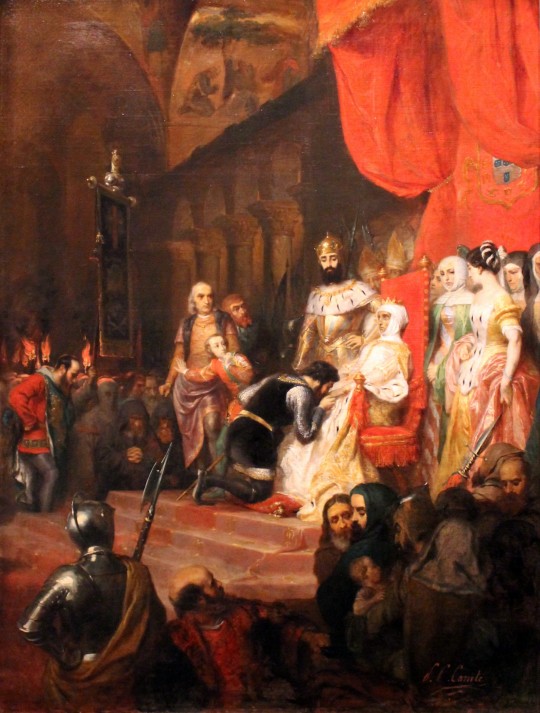
The Tombs
I saw them in early November of last year and I cannot overstate how amazing they are in real life. The whole church they're in is beautiful but the tombs are just breathtaking, especially knowing the story behind them.
They're the reason I wanted to make this post. They are considered some of the greatest masterpieces of portuguese gothic sculpture. They are full of intricate carvings and, despite missing a few pieces here and there, are still in amazingly good condition today. You can visit them for free any time.
Here are the pictures I promised. The last 2 are taken by me!

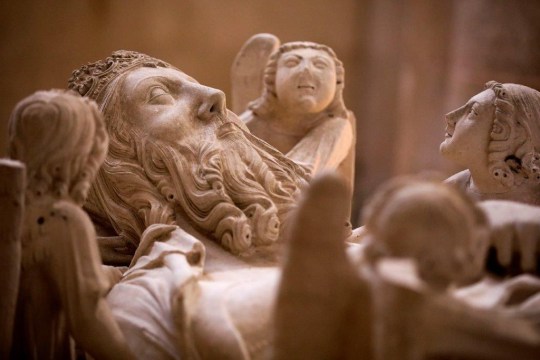
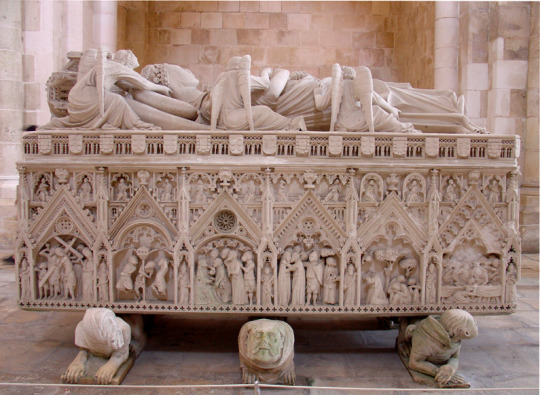
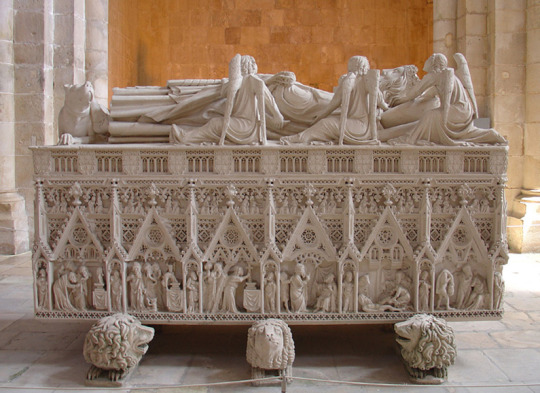
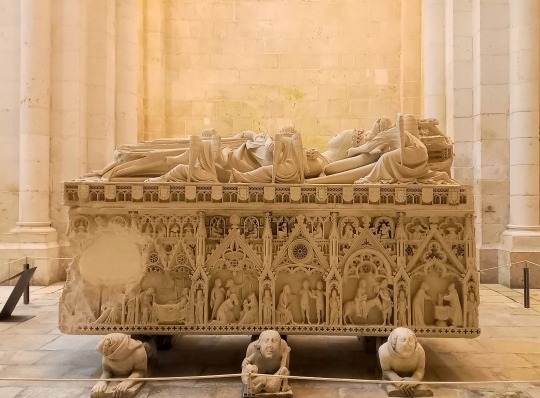

Some historical notes (cool facts)
This is mostly about the corpse coronation part because I found it in my research and thought it was cool.
The first dynasty of portuguese kings didn't have coronations. They were seen as warrior kings first and foremost, and therefore felt no need to pledge their allegiance to Christianity. If they did swear over something, it was a shield. They did not have the fancy ceremony.
What can we learn from all this, you ask?
Write that overdramatic romance you've been wanting to. You'll never out-drama queen King Pedro the 1st.
#as a kid i always felt really bad for Constança#she literally got pushed aside in the history she was a part of#no one cares about her???#all she is is “a woman who got cheated on”?? she deserves better!!!#anyways Pedro is the greatest drama queen to ever live#imagine being so extra about your girlfriend's death your tombs become some of the most famous sculptures in Portugal#and also the heart thing#the Middle Ages really were a time huh#portugal ramblies#portuguese history#portuguese legend#pedro e inês#happy valentine's day#<3 <3 <3#i'm not translating the names. fuck that.#i refuse to look up what the english equivalent of “Inês” is
9 notes
·
View notes
Text

#1850s#victorian#colorization#colorized#colorized photo#Infanta Maria Ana of Portugal#Infanta Antonia of Portugal#Pedro V of Portugal#Luis I of Portugal#Infante João#Infante Fernando of Portugal
4 notes
·
View notes
Photo





Pedro Mafama - Estrada
#he mixes traditional music (cante alentejano) with rumba on this song and it came out great#anyway idk im super proud of my boy i remember when he only had 2 songs out!!#portuguese music#portugal#pedro mafama
5 notes
·
View notes
Text
Hello everyone! I'm back with another Merlin au! This one is a horror-themed au for spooky season! Enjoy!
This au is Inspired by the story of King Pedro I of Portugal and Ines de Castro (which is a heartbreaking story that deserves to have more people talking about it), and it's set in a world where Merlin and Arthur are already together in season 3. After a magic reveal gone wrong, Merlin's magic was revealed while Uther was still alive, leading to Uther ordering Merlin's execution while Arthur was away on a hunting trip. When Arthur returns, he's met with the news of Merin's death, but he refuses to believe such horrible news until he rushes into Gaius's chambers, screaming for Merlin, only to find Gaius and Gwen sobbing over Merlin's body.
Arthur is overcome by grief and, after a few hours sitting in Gaius's chambers staring at Merlin's unnaturally still form with tears streaming down his face, Arthur marches off to face his father, to make him pay for his crimes. Uther is, of course, furious over Arthur getting so worked up over a treacherous sorcerer, but Arthur fights him like a madman, fueled by grief and rage.
In the end, Arthur wins the duel, and while the shocked lords and knights watching the whole ordeal were expecting Arthur to run his father through with is blade, Arthur does something that no one expects. He uses his blade to carve open Uther's chest, cutting out his heart, saying that Uther had been so heartless as to take Arthur's love from him, this ought to be his fate.
While the lords and knights were all shocked and horrified at the display, there was little they could do besides acknowledge the prince as their new ruler. Within a couple days, Uther's funeral and Arthur's coronation were organized, but Arthur still felt numb, even as the crown was placed on his head. He could almost feel the empty consort's throne next to him, where Merlin was always supposed to be, mocking him viciously.
But then, an idea formed in Arthur's not-quite-sane-anymore mind. Merlin had always deserved to sit at his side, to be honored as any consort to a king should be. Arthur had to see this through, to ensure that Merlin received the honors that he was denied during life.
Arthur ordered the servants to, under Gaius's supervision, collect Merlin's body, dress him in royal robes, and have him carried to the throne room. There was no way to make any of this right again, no way to make Arthur feel whole once more, but there was a way to make sure that Merlin's memory and all that he meant to Arthur lived on.
When the doors to the throne room finally opened, shocked and horrified gasps rose up from the assembled court at the sight that awaited them. There, being carried in on a stone slab, lay Merlin's pale, prone body, dressed in royal finery from Arthur's own wardrobe. His colorless pallor against the rich red robes created a striking and distinctly disturbing contrast, which was only heightened by the colorful jewelry that accompanied the outfit.
Arthur imagined what a magnificent sight Merlin would have made if he were alive and yearned for such a vision with all of his heart. But the reality of the situation was as grim as the expressions of the knights carrying Merlin's body. Merlin was gone, taking Arthur heart and all of his joy with him, and all that was left for Arthur to feel was somber determination to make at least one thing right: Merlin would be honored and remembered as a king.
The crowd's shocked whispering didn't cease as the procession passed them and made its way towards the thrones, reverently placing the slab in front of the steps to the throne, but they were shocked into silence as Arthur picked up Merlin's body and cradled him gently before carrying him over to the consort's throne and placing him on it with the greatest care.
The court was silenced at the disturbing sight of a limp body sitting in the queen's throne, but horrified gasps shot up from the crowd as the king suddenly turned around to face them, his eyes bloodshot and glaring at them all.
"You, all of you, stood by and let my father do this! And now, you will show your respect to the man you had forsaken. Merlin was everything to me, and I never had any intention to rule without him by my side. Living or dead, if I am king, then so is he."
Arthur slowly made his way back to his own throne and sat down, a picture of royal power. His eyes darted over to Merlin for a second, before shifting back over the crowd. Still, was it just Arthur's desperate imagination, or was there now a slight flush in Merlin's skin that wasn't there earlier?
"Just as you all knelt before me and took an oath of fealty, you will do the same for him. You will give him all of the honor he deserved in life."
At first, the lords in attendance just looked at him in utter disbelief, but the fierce glare Arthur sent them confirmed that the king was being entirely serious. Slowly, each of the lords knelt before the consort's throne, not daring to look up at the disturbing sight before them, and recited their oaths of fealty, feeling the king's burning gaze on them all the while.
Finally, after all of the lords had taken their oaths, a pale Geoffrey presented Arthur with the consort's crown, a treasure that had not been seen by anyone since Ygraine's passing. Arthur gingerly lifted the crown and made his way over to Merlin.
As he stepped closer, Arthur wanted to weep. Perhaps it was some cruel trick his mind was playing on him, put it looked like Merlin's color had returned to him, making him appear like he was only sleeping, like he would wake up and everything would be fine again.
Taking a steadying breath to hold his tears at bay, Arthur finally stepped right in front of Merlin, holding the crown over his motionless head. It wasn't fair, Arthur decided. It wasn't fair that Arthur had finally become king, was finally in a place where he could openly profess his love for Merlin, but Merlin wasn't here by his side to see it!
Still, he could let everyone else see his love for Merlin. Slowly, he lowered the crown onto Merlin's head, letting rest on his limp head. Arthur took a shaking step back, trembling with rage and grief as he looked at Merlin, bedecked in royal robes and wearing the crown that Arthur had always longest to give him. Arthur's own mind still mocked him, making Merlin look almost alive again, like he was only sleeping, when Arthur when that Merlin was gone, and all that was left of him was this pale, empty shell and a terrible hollowness in Arthur's chest where his heart was supposed to be.
Arthur tenderly gasped Merlin's chin, tilting his head up to face him. This was goodbye, Arthur knew it. After this, Merlin would be laid to rest with all the honors of a king, and Arthur would be left ruling over his kingdom alone and heartbroken for the rest of his days. With tears flowing freely down his face, Arthur leaned down and pressed a kiss onto Merlin's lips. Once again, Arthur's mind took pity on him, as he could swear that Merlin's lips were warm with life under his own.
Arthur drew back, gazing at his love's face for what might be the last time, attempting to commit every minute detail to memory, such that Merlin's likeness would never fade from his mind even as the years went by. As Arthur eyes scanned over Merlin's face, however, there was one thing that struck him as odd before his mind caught up to what he was seeing and his heart, which had felt cold and frozen fir days, started beating at a frantic rhythm.
Because Merlin's eyes were open.
(Yes, Merlin was immortal the whole time, but his magic was just taking a while to heal him lol!)
And that's all for now! I hope you all enjoyed this au! Let me know if you'd like to see a continuation!
And, as always, thank you for reading through my ramblings! :D
208 notes
·
View notes
Text










taylorswift: It’s official, I left my 🤍 in Lisbon. My first time in Portugal and you all made me feel like I was right at home. I’ll seriously never forget the way you treated us, the overwhelming love and passion and hands in the air and dancing and how you screamed every lyric!! Muito obrigada 🇵🇹
📷: Pedro Gomes / @GettyImages
256 notes
·
View notes
Text
We didn’t even get a proper revolutionary war over here, actually. You see, back at the beginning of the 19th century, when Napoleon started conquering all of Europe, Portugal and England were like, besties, so he was 100% intent on invading Portugal and hopefully attaching it to France, which would be a pretty big blow to the English. Which he hated. Because he was French. What he didn’t expect was that, king John XI of Portugal (well, prince regent at the time. His mom was still queen but she had dementia so he called the shots) decided to just like, hop on a boat with his immediate family and come hide in Brazil, which was still a colony of theirs at the time. Later on, during his time in exile, Napoleon would refer to John XI as “the only one who managed to trick me”.
They stayed here for 13 years, which were times of rapid growth and prosperity for Brazil! The royal family residing here meant we went through quick urbanization, were allowed access to the newest European technologies and enjoyed a LOT more political freedom as a country. Also the king was reportedly a pretty chill dude and we liked having him and his family around well enough.
As you’d expect, though, things were not going well in Portugal like, at ALL. The British had managed to repel Napoleon’s troops but the country was on the brink of civil war and there were plots to declare it a republic. The court demanded that the royal family returned at once, which they did, but the king allowed his first born son, Pedro, to stay behind to act as regent. The court wasn’t particularly pleased by that, going “Hey, no, that was not our deal. We wanted you ALL to come back. You come back here right now, young man!” but us Brazilians were not super keen on the idea of going back to being “just a colony”, and neither did the prince. After all, he had practically grown up here! He sympathized much more with the people of Brazil than with the Portuguese court, which he hadn’t had any contact with since he was nine years old. So he was like “You know what? I’m not only staying, but I’m also siding with the Brazilians. I shall declare full independence AND become the first emperor of Brazil. So suck it, dad.”
#Reporting live#In a way that’s kind of cool also. It’s like if George III’s son was like “Hey dad I decided I want to be American now”
84 notes
·
View notes
Text

Queen Victoria to her uncle King Leopold I of the Belgians, on the potential future husband of his daughter Princess Charlotte of Belgium:
September 19 of 1856: We are both [she and her husband Prince Albert] very desirous that dear Pedro [V, King of Portugal] be preferred by Charlotte. He is by far the most distinguished young Prince there is, and he is also as good, excellent and firm as one could desire, as one could wish for an only and beloved daughter. It would also be a great blessing for Portugal to have a kind and well-mannered Queen, this has never happened before. I am sure that you would be much calmer about Charlotte's happiness than if you gave her to one of these innumerable Archdukes or to Prince Georg of Saxony.
Pictured: Queen Victoria and other Royals watching Fra Diavolo, by Frances Elizabeth Wynne. From left to right: Queen Victoria, Leopold I of the Belgians, Princess Charlotte of Belgium, Prince Albert (standing), Victoria Princess Royal, Friedrich Prince of Prussia, Lady Frances Jocelyn.
#leopold to victoria like a month later: you're not gonna believe this#queen victoria of the united kingdom#leopold i of the belgians#empress carlota of mexico#pedro v of portugal
14 notes
·
View notes
Text
Did you know that the first map of the Himalayas was made in the 1500s by the Catalan monk Antoni de Montserrat, and it was so accurate that it was used by European expeditions until the 1800s?
Here's the story of a priest that was called by a Mughal emperor for interfaith intercultural dialogue and who ended up being -among other things- a royal teacher, a writer, a geographer, a fake Armenian merchant, and a prisoner.
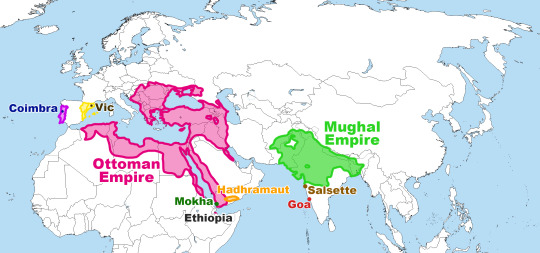
Antoni de Montserrat was born in 1536 in Vic (Catalonia). He studied in Barcelona (Catalonia) and Coimbra (Portugal) to become a priest and joined the Jesuits. In 1574, he was sent on a mission to Goa (back then a Portuguese colony, now part of India).
The Mughal emperor Akbar was an open-minded man. He was Muslim but wanted to learn about the other religions, so he called representatives of different religions to his court in Fatehpur Sikri. In 1579, he called the Jesuits to explain Christianity, and the Jesuits sent Antoni de Montserrat. Everyone in the court -Muslims, Christians, Buddhists, Hindus- knew that the point was not to convert others, but to reach a better understanding through debate.
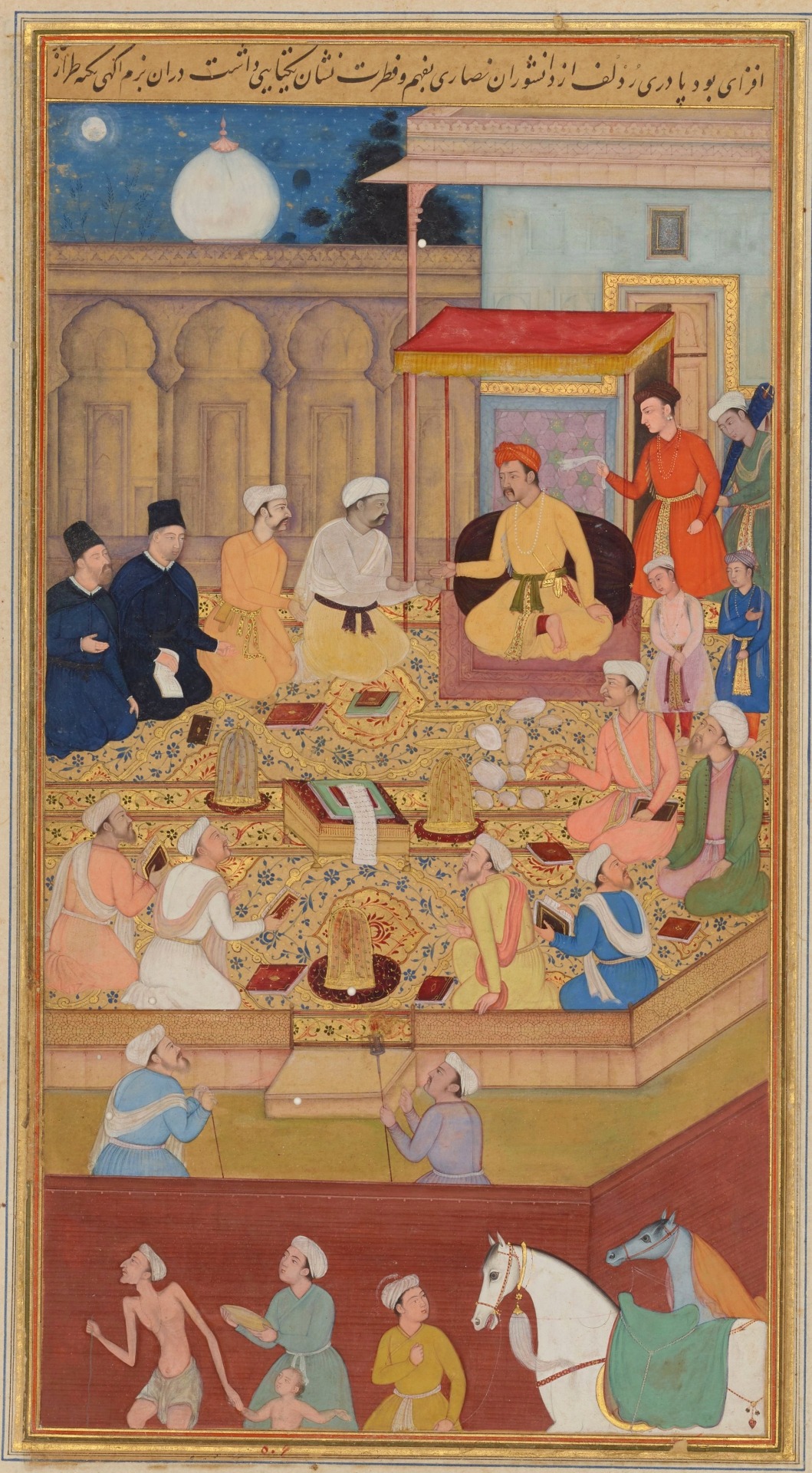
The Mughal emperor Akbar holding an assembly with religious men. The two men dressed in black are Jesuits. Miniature painting by Nar Singh, 1605. Chester Beautty Library.
The emperor Akbar valued Antoni de Montserrat as a great wise man and chose him to become the tutor of his second son Murâd. Antoni learned Persian (the language of the Mughal court) and accepted. He remained close to the emperor and accompanied him in the military campaign when the emperor's step-brother started an uprising in Bengala. Crossing much of Northern India, Kashmir, Pakistan, Afghanistan, and Tibet on elephant gave him the perspective to draw the map.
In the end, Antoni went back to Goa in 1582. There, he wrote a book explaining what he had seen in the Mughal Empire, the cultural differences he had experienced, the political organization of these territories, and describing emperor Akbar's court. This book is called Mongolicae Legationis Commentarius, and its descriptions of the lands he has travelled include the earliest description of Tibetans known in Europe since Marco Polo and the first ever map of the Himalayas.
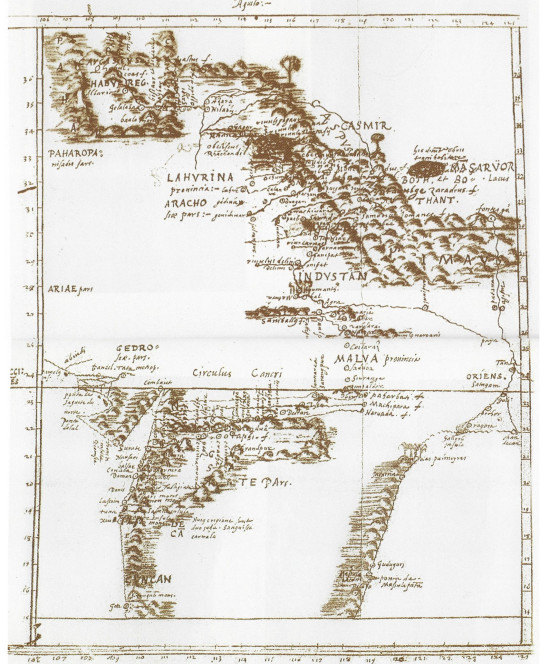
Antoni de Montserrat's map of the Himalayas and their surroundings, including large parts of what nowadays is India, Tibet, Pakistan, and Afghanistan. Library of St. Paul's Cathedral, Kolkata (India).
This book explains cultural elements of the different cultures under the Mughal Empire and also the conversations Antoni had with the emperor about certain habits. For example, Antoni writes about how the Brahmans (upper caste Hindu priests) force widows to be burned alive in the same funeral pyre as their dead husbands, often (when the women resist) drugging them or through violence. Antoni tries to get emperor Akbar to stop this terrible tradition, but doesn't succeed. On the other hand, Antoni also tells the emperor Akbar that they should burn the "men who dress as women" who live in the emperor's court, to which the emperor bursts laughing out loud and doesn't give any consideration to. Despite their different cultural backgrounds, Antoni and Akbar were friends.
Antoni's time in the Mughal Empire ended in 1588, when the king Philip II of Castilla and I of Portugal orders Antoni and a young Spanish priest named Pedro Páez to go to Ethiopia to convince the Coptic Christian Ethiopians to get closer to the Catholic Christian Church. Then, Antoni and Pedro dressed up as an Armenian merchants to border the Ottoman Empire through Iraq, Syria, and Egypt, trying to avoid the pirates of the Indian Ocean. However, before reaching Ethiopia, they took a ship to skirt modern-day Oman, but the captain turned them in as soon as they reached land in Yemen. Then, Antoni and Pedro were taken on a camel caravan to the Sultan of Hadhramaut (Yemen), who imprisoned them until 1595 and then sentenced to galleys in the Red Sea, and later imprisoned them again. Luckily for them, king Philip paid their rescue and they were freed in 1596. With his body weakened by the galleys and the mistreatments of prison, Antoni retired to a convent in Salsette (modern-day Mumbai, India), where he died in 1600 right after having finished his map.
The Spanish priest who travelled with him, Pedro Páez, also wrote his own diary explaining what they lived. With his descriptions, we know that in Yemen Antoni and Pedro were given what he describes as a kind of herbal tea called "cahua, water boiled with a fruit named bun and which is drank very hot, instead of wine": that is a drink that was still unknown in Europe at the time, which we now call coffee.
Maybe you have heard the name Pedro Páez before, too. After accompanying Antoni to Goa, he went to Ethiopia again, successfully this time. In Ethiopia, he became the first European to reach the source of the Blue Nile.
Information sources: David Montserrat Nonó (La Mira), Sociedad Geográfica Española. If you want to read Antoni de Montserrat's book, it has been translated from Latin to Catalan and to Spanish by Josep Lluís Alay.
#història#antoni de montserrat#pedro páez#mughal empire#mughal#history#catalonia#catalan#renaissance#european history#asian history#asia#india#indian history#interfaith#geography#1500s#16th century#travel#other countries
65 notes
·
View notes
Text

@justalovingfan girl I was gonna leave this alone but let me tell you where you fucked up at, and I know you're going to try to claim it's not you, and what am i talking about, and I'm crazy, and i just don't want anyone to say anything bad about Coco and Pedro, I could give two fucks of a damn but what you're not going to do is act like you not messy, when you really are and not even in the good way. That wide angle photo of Pedro and Coco and that guide in Malta that you posted, no one else has that it wasn't posted anywhere else. Now I know what you're going to do, you're going to try to claim it was in the original post that the girl posted, but most people don't remember, because she deleted it. you think you're good and in the clear, but I take screenshots of everything especially that so I know what she posted and that ain't it.

Yet here you are the only person who has the wide angle of that photo.

So clearly you are the one who took it because you are in fact Missy AKA purple nails.
And again you're going to try to say it's not you I don't know what I'm talking about, but even you're tag name is from your own posting

Two Loving fans just trying to show how much they care.. "just a loving fan" come on it doesn't take a rocket scientist to put two and two together. Also the way you are going into great detail about her being from Portugal and only being in Miami for a short time, all we knew about was the Miami part especially since less than several hours after posting that rant she deleted it, so no one has anything besides screenshots of the picture of Pedro, and her rant even on tiktok, so you knowing that she's born and raised in Portugal, and other personal details about her that besides her handle on Instagram, and these posts no one knows about? come on you gave yourself away with that, and your in-depth step by step adventures in Malta.



Also that screenshot of Coco explaining to you what happened and she apologized why are you still mad almost a year later? Explain how in this purple nails AKA Missy AKA YOU tell Coco you're upset that Pedro was rude to you remember nowhere in this does she say Coco was mean to her AKA you, you even called her sweetheart at the end

But then in this you're blaming the cold interaction all on Coco? Like how you tell her to mind her own business when you AKA Missy AKA purple nails went in her DMS and sent it to her? Like are you okay in the head? are you good?do you need to see a psychiatrist?

You started this account last year so I'm going to take a guess and say that, that G2 premiere was the trigger wasn't it? it brought back those unpleasant Malta memories of the time being a crazy fan bit you in the ass 🤣.
35 notes
·
View notes
Text

Pedri via Residency - May 28, 2024
What is something you still want to accomplish in life? - " A lot of things. I am still very young or do you already want to kill me?"
Favourite teammate at Barça? - "I am close with the group in general but Ferran"
Do you play any instruments? or would you like to learn how to play one? - "Better not for the sake of the rest of the people. I like to listen to music but not much else" Favourite series or movie? - "Mi reno de peluche and the one about chapo guzman; favourite favourite is Prison Break and La que se avecina"
Do you know anything about Armenia? - "not too much, to be honest… but recently a very nice driver took me to a shooting was from there. His name was Ara"
Favourite moment of the season? - "It wasn't the best season. On a personal level, I would say the brace."
How do you deal with criticism? - "I try to stay out of it, although it's not always possible, of course... you have to try and keep going and keep believing in yourself"
How do you feel about being able to play for Spain after such a long time? - "Very happy. I haven't been able to play for Spain for a long time. Hopefully we will have great EUROs and also a great 24/25 season with Barça"
How did you feel after the brace? - "crazyyyyy"
"I always try to stop and sign, because I remember when I asked for signatures as a kid"
Plans for the summer? - "I hope to go on vacation, but in a month and a half… that will mean that we go far in the euro with the national team"
Have you eaten German food before? - "Yesss... a member of my marketing team is German and he made us German food a long time ago, with sausages and so on"
How is your English? - "I still have to improve a lot. Give me a few months and I will answer in English"
Do you miss doing anything in your daily life? - "I can't complain. I like to live in peace"
Would you like to go to China? - "Of course, yes. Althpugh in the season there is not really time for anything and during holidays I prefer to stay close and rest. Let's see if we ever have a tour in China"
How many trophies have you won? - "With Barça, La Liga, Copa and Supercopa"
Do you feel ready for the EUROs? - "Siiii"
5 UCL Trophies or a World Cup? - "I don't want to choose. I would like to win it all"
Would you like to play against Portugal in the EUROs final? - "Sure. As long as we play in the final, I don't care against who it is"
Pele or Maradona? - "Maradona... Because he played for Barça and my father told me about him when I was younger. I remember the day he died very well because it was my 18th birthday"
Have you been to New York? - "Yes"
Favourite team to play against? - "Obviously Barça" (he did NOT understand that question lmaooo back to duolingo it is)
Visit Uruguay? You have a lot of fans here - "Ronald also told me once... We'll have to listen to him, because otherwise he gets angry"
How was it going to the Spanish GP in 2022? Are you going this year? - "It was a crazy experience. I don't think I can go this year because it clashes with the EUROs"
Do you like going to concerts? - "I haven't been to many, honestly... I have yet to go to one of Quevedo's. And last year they invited me from Spotify to see Coldplay in Barcelona but in the end I didn't go and I regretted it a little. Teammates went and they love it" (who tf turns down coldplay tickets??? 😭)
Your dad is a great person. - "The best"
How do you feel about receiving so much love? - "Very proud and privileged"
Do you want to score for Spain during the EUROs? - "Clarooo. Let's see if I can make it happen, because I haven't scored for Spain yet"
Red or blue? - "Azulgrana"
Do you like to cook? - "I'm not very good at cooking... My brother and mother are much better"
Pedri or Pedro? - "Pedri... Pedro sounds strange to me. From a young age they already called me Pedri, because there was another boy in the team whose name was Pedro and it was to differentiate us... and everyone calls me Pedri"
What do you think of Alexia, Aitana and Marta? - "They are top footballers!"
Is it difficult to have a 'normal' life? - "It's not easy, but mine doesn't change that much because I really like to be quiet and at home"
Only fish or only meat? - "I prefer meat... but for nutrition, fish"
When you were a kid did you make trouble in class? - "I was more of a quite kid"
Who do you think will win the Golden Boy award? - "Well, I hope a Barça teammate. Lamine, and if not Cubarsi"
What inspires you to perform at such a high level on the field? - "I do what I like the most"
What do you think of your season at Barça this year? - "I was saying this the other day. It hasn't been an easy season and I hope the next one will be much better in every single way and we will win titles"
Have you ever wished to have a sister? - "My mother always wanted to have a daughter, but in the end she had to settle for Fer and me hahaha"
How do you feel for the EUROs? - "Very good. Better and better"
Blue or Black? - "Blue"

74 notes
·
View notes